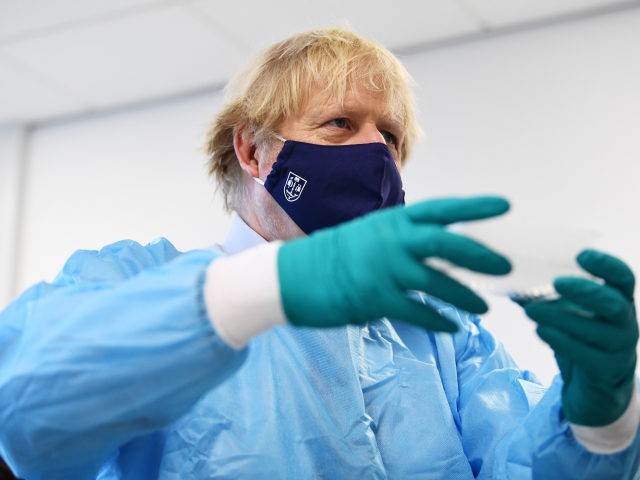The United Kingdom has reportedly become the first country so secure in its coronavirus vaccination strategy, that it is already planning to stockpile doses for 2022. Meanwhile, the European Union remains far behind even in its inoculation programme for 2021.
European media admitted in the last week that Brexit Britain’s initiative had laid the ground for “vaccination success”, with more than 13 per cent of the population covered, while on average the European Union has struggled to vaccinate barely two per cent of its inhabitants.
In early December, the UK became the first Western country to approve a vaccine, made by Pfizer-BioNTech, for use, with the Oxford-AstraZeneca shot being authorised later that month. The government is also engaging other vaccine producers such as Moderna, Janssen, Novavax, GlaxoSmithKline, and French pharmaceutical company Valneva which has a site in Scotland.
On Monday, the BBC reported that the government has almost doubled its order for the Valneva vaccine to 100 million, which should be available in 2022 should Britons need revaccinating next winter or beyond.
Prime Minister Boris Johnson told the Evening Standard: “This is a promising vaccine and if approved by our regulator, I’m confident that with these additional doses as well as our existing pipeline, the UK will be able to protect our citizens next year and beyond.”
“The UK is making great strides in our plan to vaccinate the most vulnerable in society by the middle of this month, with nearly nine million people having received their first jab already,” the prime minister said on Monday morning.
Vaccines: Brexit Britain Willing to Help Bail Out Failing EU https://t.co/0qYARFqdGm
— Breitbart London (@BreitbartLondon) January 31, 2021
The remarks come after Mr Johnson guaranteed that current disputes between AstraZeneca and the European Union would not interfere with the drugs company delivering on its contract to the United Kingdom. The Swedish-British firm announced last week it could not fulfil the first yield to the bloc due to production problems at its European plants, reportedly as a result of delays on the part of Brussels to agree on a deal with the drugs company.
The bloc has since threatened an export ban and demanded British-made drugs be sent to Europe. European Commission President Ursula von der Leyen also backed down from her plans to impose an internal border on the island of Ireland — between the UK’s Northern Ireland and the EU’s Republic of Ireland — to prevent vaccines leaving the bloc.
“You will have seen all this stuff in the papers about our friends across the Channel and disputes with them,” Prime Minister Johnson said on Sunday.
“All I would say is whatever the toings and froings there, we’re very confident in our security of supply.
“We will continue to take steps to protect the UK’s security of supply and also to ensure that we ramp up our own manufacturing.”
'You Can Wait' – WHO Asks UK to Pause Vaccinations Until Other Countries Catch Up https://t.co/numCx9J0zv
— Breitbart London (@BreitbartLondon) January 31, 2021
Britain has now secured 407 million doses, more than enough for its inhabitants, with Vaccines Minister Nadhim Zahawi saying that surplus could be sent abroad to “not only help tackle Covid-19 here in the UK, but aid our mission to ensure there is a fair supply of vaccines across the globe. No-one is safe until the whole world is safe.”
International Trade Secretary Liz Truss also implied that the UK was willing to help EU countries recover from the bloc’s inadequate planning, telling Sky News on Sunday: “It won’t benefit people in Britain if we become a vaccinated island and many other countries don’t have the vaccine, because the virus will continue to spread.”
“It’s a bit too early to say how we would deploy excess vaccines, but we’d certainly want to work with friends and neighbours, we want to work with developing countries, because we are only going to solve this issue once everybody in the world is vaccinated,” Ms Truss added.
Mrs von der Leyen also alleged that Johnson had assured her the EU could receive AstraZeneca vaccines made at the two factories in Britain.
EU Imposes Hard Border on Northern Ireland to Seize Vaccines, Then Backs Down https://t.co/ANcqW4YSTG
— Breitbart London (@BreitbartLondon) January 30, 2021
The Evening Standard claimed that the UK has become the first country to announce it is preparing a stockpile of coronavirus vaccinations. However, despite the EU’s current failings, the newspaper notes that the bloc is yet to make a similar deal with the French-owned company to secure future supplies.
David Lawrence, a Scottish executive at Valneva, told Brussels that it must begin planning ahead, telling BBC Radio 4’s Today programme: “We have got to book slots with suppliers who are giving us key components. The supply process isn’t something to switch on and off over a few weeks.”
Commission President von der Leyen has come under fire from colleagues and European media over her failure to secure vaccine contracts earlier, with calls for her to resign.
“And what did the EU do? It created the biggest confidence-destroying programme in its history." https://t.co/2cB314PR74
— Breitbart London (@BreitbartLondon) February 1, 2021

COMMENTS
Please let us know if you're having issues with commenting.